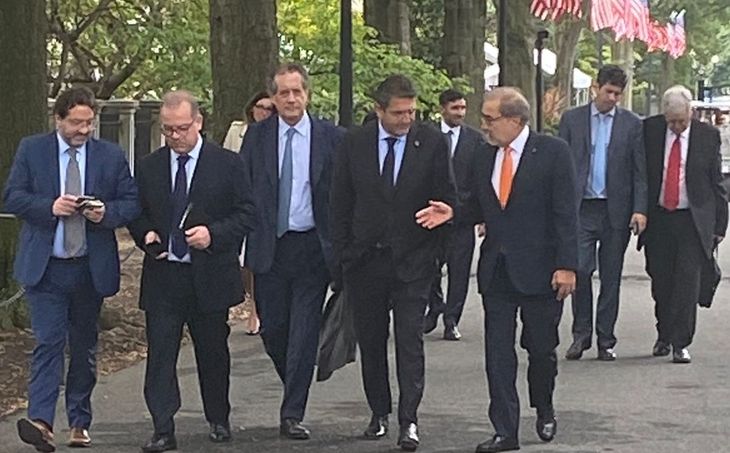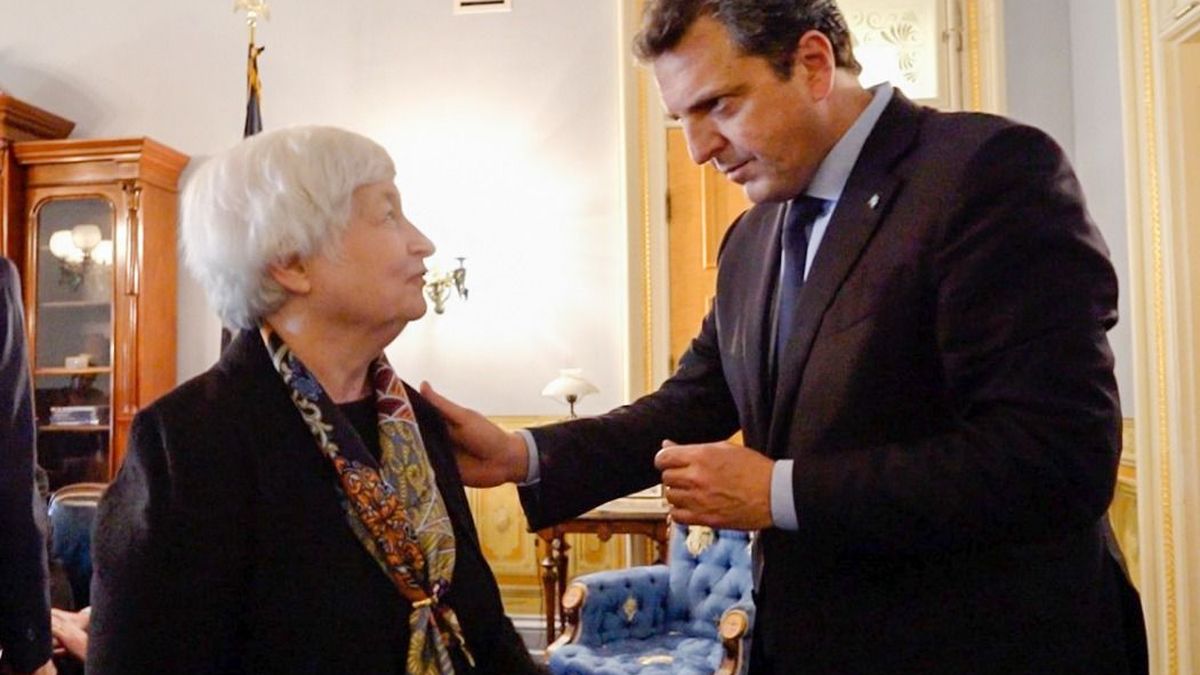massa yellen 3.jfif
Massam was accompanied by Secretary of Economic Programming Policy, Gabriel Rubinstein; the president of the Central Bank, Miguel Pesce; the head of Advisors to the Ministry, Leonardo Madcur; the director of the National Institute of Statistics and Censuses (Indec) and coordinator of relations with the organizations, Marco Lavagna; and the Argentine ambassador in Washington, Jorge Argüello.
While Lipton was accompanied by Michael Kaplan, Assistant Secretary for Western Hemisphere Affairs; and Andy Baukol, Under Secretary for International Affairs.
massaaaaa.jpg

Meeting with the IMF
Economy Minister Sergio Massa is likely to reach an agreement with the IMF staff today. If materialized, this agreement will be made official by Kristalina Georgieva, at the meeting they will hold in the IMF building. Everything must be recorded in a written document, which is worked on until the last minute. Said statement will not only contain the commitments fulfilled in this second review of the program that Argentina took, but also the next quarterly goals, always with an eye fixed on the true annual goals that, according to the Government itself, must be met yes or yes.
This is what the minister told him just a few hours ago Ambit: “The program with the IMF has objectives and we have to work to fulfill them because it is part of the commitments that Argentina assumed as a country.”
Oddly enough, each word in the document has its own weight, is weighed and discussed on one side and the other. “Even the commas and points of the statement are negotiated,” jokes a source from the delegation. Minister Massa wants to leave this city with the agreement in writing, although, it is known, it will be later the IMF staff that will have to submit it to the board for approval. The fight is also to manage what concepts the IMF will agree to include in that official message. It is well known that both President Alberto Fernández and Massa himself have been insisting on the idea that Argentina was harmed by the consequences of the war in Ukraine. Less reserves, more inflation. As a result of these shortcomings, the Palacio de Hacienda has brought to the discussion table not only certain mitigating factors that the Fund should consider, but also the request for the IMF to support some initiatives, such as the exchange of information with the US. to find Argentines who evade paying taxes by depositing their money in US accounts. In the Government they calculate that, in terms of fiscal deficit, the war implied an additional equivalent to 0.7% of GDP.
To add one more nuance, there are the official sources, who told Ámbito that all these conversations are of an eminently technical nature, ergo, not political. This, despite all the support capital obtained by the minister in recent days, both in the White House, specifically the State Department, but also with multilateral organizations such as the Inter-American Development Bank (IDB) and the World Bank. , where he obtained the promise of immediate transfers from steps that unlocked the previously established agreements.
Massa’s idea is not to put into play those patiently cultivated implicit endorsements of a political nature while it is not necessary: he wants to consolidate a view of consensus with the IMF staff, a route that allows him to look forward. “We have been doing technical work from all areas of the Ministry of Economy in conjunction with the technical areas of the IMF to close the second quarter review and to build the prospective document, which is how the IMF sees and how we, the two forward. And I think that, in this sense, the week that passed was good, from what I understand, because of the information that was communicated to me in the team”, Massa told Ámbito.
The most important thing now
Despite the entire sequence, there is one more detail that should be mentioned: the 2023 budget. The minister’s thoughts are not only here, but also seem tied up with the soon-to-be-sent to Congress of the spending and revenue plan. It will be September 14. Apart from the projections of growth and inflation -which will remain far from what Martín Guzmán dreamed of and drew-, Massa repeats that this year will be fulfilled with the reduction of the deficit to a level of 2.5% of the GDP, and that he also The commitment to the IMF for 2023 will be included in the bill, that is, a deficit of 1.9%. If you think about it, Massa would return to Buenos Aires with the endorsement of the IMF and the political backing of the White House, but conditional on winning the parliamentary contest. If you think about it, what excites Washington is this: that of all the elements that Minister Massa has at hand to meet the goals, the most immediate and possible is the exercise of fiscalism. Said in Creole, if he cannot drastically modify what happens with the reserves in the short term, he can do so in relation to public spending and the budgetary commitment.
Houston, we have a problem
Massa’s idea is that beyond the negotiations with the IMF, the objective is and must be in the future and at all times, to accumulate reserves in the BCRA because, according to those around him, the official believes that, apart from other things, it is also a guarantee of governability.
As mentioned, in terms of IMF demands, for the Government there are two factors that must be incorporated into the equation: on the one hand, that the agreement was signed some time before the economic consequences of the war between Russia and Ukraine, which could enable new talks in the near future, but not from the Government but from the organization itself and even within the framework of the United Nations.
On the other, that the implicit cost in terms of reserves that were not integrated could be calculated theoretically if the US$9 billion of the swap with China are taken into account, the US$6 billion that Russia could not transfer due to the SDR , some US$1.2 billion in disbursements from China that were not made because of the dams and even the US$1.7 billion that were delayed by the IDB and that Massa himself managed to unblock now. To this could be added almost US$5 billion of the cost of energy.
The last few days helped. Last Friday, in Houston, within the framework of an important meeting with the main US oil companies, Massa obtained the announcement of new investments for the country for US$1,030 million. There are US$330 million from Chevron to start Trapeal, a third production area in Vaca Muerta, and US$700 million from Total to promote Plan Fenix, a development in the Austral basin 150 km from the Río Grande.
political backing
Related to his time in the White House, Massa said: “It was an agenda of meetings related to energy and food security issues that are part of the agreements of the Summit of the Americas and the G7 Agreement in which the Argentina”.
The meetings took place with key officials from the Joe Biden administration: National Security Advisor Jake Sullivan; Juan González, Senior Advisor for Latin America and Mike Pyle, Deputy International Economic Advisor to the National Security Council. “Obviously, discussions arose regarding what the best scenario is, understanding that the war generates an impact on the global economy that we cannot fail to put on any discussion table,” Massa told Ámbito. “International energy prices condemn Europe to a scenario of enormous economic and political instability, they put us to the test for 2023 in the challenge of having a very ambitious program, but also very professionally developed to prevent Argentina from having to continue importing the levels of LNG that it has had to buy”.
In the minister’s opinion, “the world has four major issues under discussion for the next two years: critical minerals, energy, the knowledge economy and proteins. Argentina, beyond the difficulties it has today, has an enormous opportunity in the long term”.
strategic plan
The conference held this week at the Baker Institute of Rice University left enthusiasm. The main references of the oil companies present were in favor of the regulatory and fiscal framework proposed by the minister.
“In the short term,” Massa told this morning, “we have the responsibility to establish a production volume for next winter that allows us to increase the number of molecules because we need the highest level of production in the local market with prices that are much higher.” more competitive”. “We have to plan for 2023 on the basis of extending the Gas Plan 4, at the same time, implement the Gas Plan 5 to guarantee the filling of the gas pipeline and that requires investments that should begin to materialize in November with a view to increasing the capacity of production”. Along these lines, the Tigrens pointed out that “there is a gas pipeline that is being little used with respect to its capacity in the Austral Basin, for which reason the stimulus should be tried to add gas production in northern Argentina.”
“In the medium term, the key is to increase production to comply with the energy self-sufficiency process, but also to increase the volume of exports with uninterruptible contracts, that will allow us to improve our energy trade balance, increase the number of jobs and increase the volume of investment in the oil and gas sector, because they are investment-intensive sectors,” said Massa.
Source: Ambito
David William is a talented author who has made a name for himself in the world of writing. He is a professional author who writes on a wide range of topics, from general interest to opinion news. David is currently working as a writer at 24 hours worlds where he brings his unique perspective and in-depth research to his articles, making them both informative and engaging.




